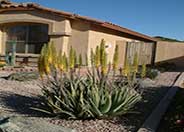
Common name:Aloe Vera or Medicinal Aloe
Botanical name:Aloe vera
The rosette of this plant consists of fleshy gray green leaves, which are narrow, succulent and erect with soft spines on margins. This Aloe is a slow to moderate grower. Flowers are spikes of yellow, 2'-3' tall and bloom late winter to summer. This aloe can form large clumps. It will tolerate full to partial sun, needs some supplemental water in heat and good drainage. It attracts hummingbirds. This aloe is a Mediterranean native. The sap is used for burns and abrasions.

Common name:Dusty Miller, Silver Groundsel
Botanical name:Senecio cineraria
The Dusty Miller exhibits growth to 1' or more, with velvet gray leaves that have broad, roundish lobes. Yellow flower heads appear through the middle of the plant during most months of the year. Cut heads back occasionally to encourage bushiness.

Common name:Bush or Dome Euphorbia
Botanical name:Euphorbia characias
This perennial will reach about 4' tall and has blue green leaves with bright green flowers that bloom from late winter to early spring.

Common name:Kleinia
Botanical name:Senecio mandraliscae
This succulent perennial will grow to about 1.5' tall and 2' wide. It has curved, bluish gray leaves that are about 3.5" long and very slender.
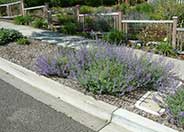
Common name:Catmint
Botanical name:Nepeta X faassenii
Nepeta faassenii makes soft, gray green, undulating mounds that are 1.5' high when blooming. The small leaves are attractive to cats. This perennial has lavender blue flowers in late spring and early summer.
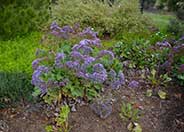
Common name:Sea Lavender, Statice
Botanical name:Limonium perezii
This mounding shrub will reach about 3' high and has large, dark green leaves with small blue and purple flowers that bloom in spring and summer.
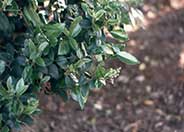
Common name:Waxleaf Privet
Botanical name:Ligustrum japonicum 'Texanum'
This dense evergreen shrub of an upright habit is capable of growing as a shrub or small tree. Its dark green, leathery leaves are opposite those of a simple evergreen plant.
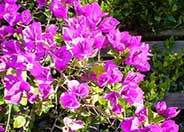
Common name:Bougainvillea
Botanical name:Bougainvillea spectabilis
This species is hardy and vigorous, with a showy, ornamental display of purple color. It blooms well in areas with cool summers.
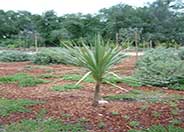
Common name:Australian-Dracaena
Botanical name:Cordyline australis
Cordyline australis is an evergreen shrub that grows 12' to 30' tall and 10' to 15' wide with sword-like leaves. It likes full sun, and is very tolerant of heat and drought. It will live in any type of soil that is well drained. Cut back to develop multiple trunks.
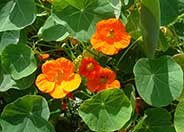
Common name:Garden Nasturtium
Botanical name:Tropaeolum majus
This annual groundcover/vine and will grow less than 1' tall, but will spread and climb up to 6' tall. Nasturtium has 2" light green leaves with edible, red, orange, yellow, or white flowers that are in constant bloom throughout the warm season. This plant usually reseeds, with new plants emerging in early spring.

Common name:Western Redbud
Botanical name:Cercis occidentalis
This deciduous shrub ranges from 6'-20' tall and 10'-15' wide. It is desirable for its magenta spring flowers, yellow to red fall color, and dangling winter seed pods. It is tolerant of many soil types, drought and oak root fungus. It attracts hummingbirds and butterflies. The Western Redbud can be found statewide in CA in the foothills below 4500' elevations in chaparral and woodland communities.
- Cornflower Farms
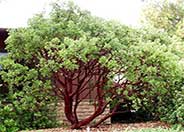
Common name:Manzanita, Dr. Hurd
Botanical name:Arctostaphylos manzanita 'Dr. Hurd'
This is a large shrub with showy bark that reaches 8'-20' tall and wide. It has dark red bark, large pale green leaves and white to pink flower clusters that bloom from February to March. - Cornflower Farms
Designer:
Photographer: GardenSoft
Practice grass-cycling by leaving short grass clippings on lawns after mowing, so that nutrients and organic matter are returned to the soil.
Attract, or buy beneficial insects such as ladybugs and lacewings to control pest outbreaks in your garden.